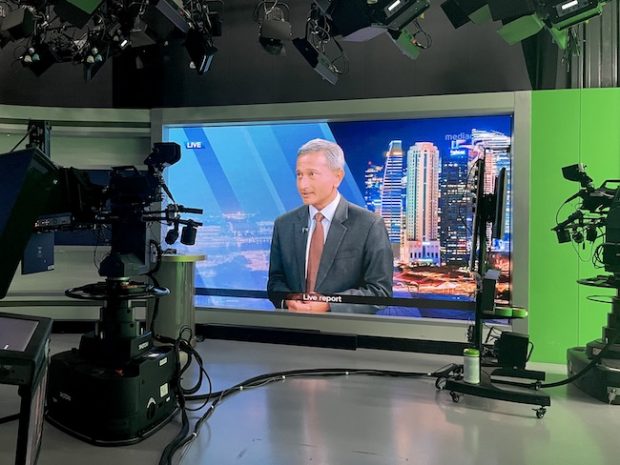An existential issue, says Singapore dubbing foul invasion of Ukraine

Dr Vivian Balakrishnan
By Ivan Lim,
Former AJA President, Contributor to AsiaN
SINGAPORE: Singapore has stood out among its Asean partners to boldly call out Russia for its invasion of its next-door neighbour Ukraine on Feb 24 that has shaken up the world.
The city-state has followed up its condemnation of Moscow with economic sanctions and restrictions that the United States and the European Union had imposed, in lieu of sending troops.
The punitive measures announced by Singapore include a ban on banks and other financial bodies having transactions with four Russian banks, plus export curbs on electronics, computers and military items.
In contrast, the 10-member Association of South-east Asian Nations (Asean) collectively called for a ceasefire or armistice and for Russia and Ukraine to resolve their hostilities through negotiations but did not follow up with any sanctions.
A day after Russia began the invasion, Singapore joined 82 member-states in co-sponsoring a United Nations Security Council motion to condemn Moscow and demand it pull out its troops.
Following the expected Kremlin veto, an emergency session of the UN General Assembly pushed through a non-binding resolution demanding Russia halt its offensive immediately and withdraw from Ukraine. Singapore and seven other members of Asean, including its current chair, Cambodia, were among 141 states out of 193 which voted in favour but not members Laos and Vietnam, both close to Moscow.
Overall, Asean was unequivocally crying foul on an increasingly isolated Kremlin for attacking an independent sovereign state in violation of the UN Charter.
Singapore reacted more stridently to Russia’s aggression as this was seen as having serious implications for the well-being of small states.
“This is an existential issue for us,” said Foreign Minister Vivian Balakrishnan in speech in Parliament on Feb 28.
“A world order based on ‘might is right’ or where ‘the strong do what they can and the weak suffer what they must’ – such a world order would be profoundly inimical to the security and survival of small states.”
Prime Minister Lee Hsien Loong reiterated Singapore’s concern about Moscow setting a bad precedent: “If international relations are based on ‘might is right’, the world will be a dangerous place for small countries like Singapore,’’ he said in a Facebook post.
And lest it be read as taking sides in the Ukraine-Russia conflict, both Mr Lee and Dr Balakrishnan, emphasized that the Republic was acting to uphold “a foundational principle.“
“Being a small country, Singapore strives to maintain good relations with all countries big and small. It does not choose sides but chart its course based on consistent principles and long-term national interests. This is why Singapore staunchly supports international law and the UN Charter, which prohibits acts of aggression against a sovereign state,”
Dr Balakrishnan was more explicit: “Unless we, as a country stand up for principles that are the very foundations for the independence and sovereignty of smaller nations, our own right to exist and prosper as a nation may be similarly be called into question one day.’’
In 2014, the Republic had voiced its opposition to the annexation of Crimea by Russia, and declared that UN members must respect the principle of non-interference in the domestic affairs of a sovereign nation.
It is expected that the Singapore government’s tough statements and imposition of sanctions against Moscow would have repercussions for the city-state, leading some netizens to express concern. One online comment said the “little red dot” ought to be “smart” rather than “loud”. Another post warned that the regional financial hub might be the next target after unconfirmed Russian cyber-attacks on Japanese businesses and industries in retaliation for Tokyo’s sanctions.
This was a price Singapore was prepared to pay for the high stakes of security and survival. From founder-Prime Minister Lee Kuan Yew to the current leadership, the island-nation’s prospects for survival and prosperity have never been taken for granted.
“Big fish eat small fish; small fish eat shrimp” was an Asian proverb cited by the late statesman in his discourse on the place of Singapore in the international arena.
Lee, who ruled from 1959 – when the British colony gained self-government — to 1965 – when it was cut adrift as an independent state following its eviction from the Federation of Malaysia – had likened Singapore to a shrimp.
“In a world of ‘big fish eat small fish; small fish eat shrimps,” he told a university audience in 1966, Singapore must be a poisonous shrimp in order to survive.
“In Nature, some species develop defence mechanisms. Some shrimps are poisonous; they sting. If you eat them, you will get digestive upsets.”
In time, the Republic was able to build up a citizen army that has kept the Republic safe and secure for more than 50 years.
This deterrent role of the Singapore Armed Forces (SAF) was underlined by Prime Minister Lee.
“We must never lose the capability to defend ourselves. National Service and a strong, operationally ready SAF is our best deterrent against aggressors,” said the son of the late Singapore leader who first laid down the nation’s time-honoured survival doctrine.





















































